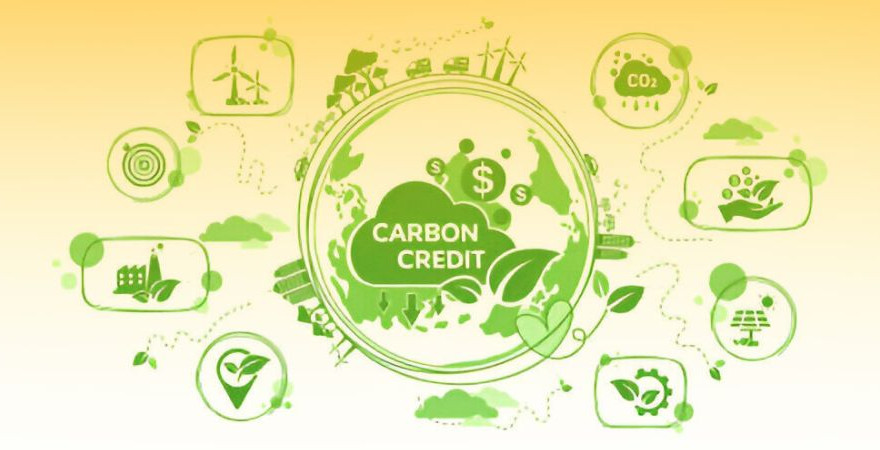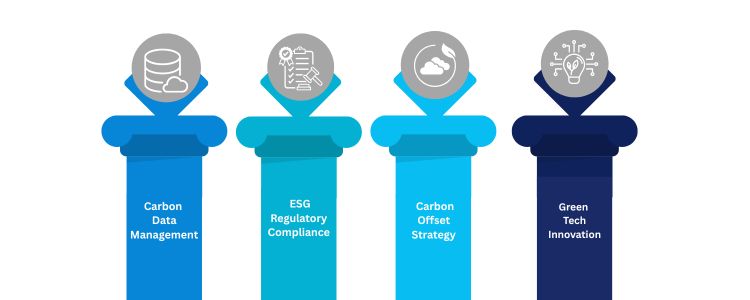
In the world running towards zero emissions, carbon credit has become an important means for companies to manage their environmental impact. In simple terms, a carbon credit is a trading permit that represents the right to emit a tonne of carbon dioxide or equivalent greenhouse gases. Companies that emit more than their permissible limit will have to buy credit to make up for their additional emissions, while low-emission companies can sell surplus credits. Beyond the environmental effects, carbon credits create a new economic ecosystem. The price of the global voluntary carbon credit market alone was more than $2 billion in 2024 and is expected to reach $50 billion by 2030 (World Bank). In this scenario, global capability centers (GCC) in India are developing as strategic drivers of corporate decarbonisation from cost-operated operational centers. From carbon accounting to carbon credit management, GCC services now manage complete carbon compliance processes for global companies.
Environmental Benefits: Economic Benefits: Global captive centers serve as an engine room managing this balance of environmental responsibility and economic opportunity.
By 2030:
As the environmental orders are getting tight and the carbon credit market is expanding, India’s GCC ecosystem is emerging as the strategic spine of corporate decarbonisation. By combining cost efficiency, digital leadership, and regulatory expertise, stability for Indian GCC global enterprises is turning an opportunity out of a challenge.
In the Inductus GCC, as a leading GCC enabler, we enable global companies to create the next generation of carbon compliance GCC in India, helping them to achieve their climate goals as well as maximising operating efficiency. As a leading GCC company in India, we believe that India’s GCC ecosystem will speed up the next wave of environmental and economic changes globally.
A Carbon Credit is a trading certificate that allows the holder to emit a tonne of carbon dioxide or equivalent greenhouse gases. These help companies to compensate for additional emissions, achieve pure-zero goals, and follow global rules supporting environmental projects. GCCs in India now manage carbon data, regulatory reporting, and even carbon credit sourcing and trading for global companies. Carbon compliance GCC is a specific global capability center that centralises carbon accounting, ESG reporting, and carbon offset strategy for its original company. India provides a lead in cost profit, skilled digital talent, a strong regulatory structure, and digital infrastructure, which makes it ideal for carbon management functions. Aditi, with a strong background in forensic science and biotechnology, brings an innovative scientific perspective to her work. Her expertise spans research, analytics, and strategic advisory in consulting and GCC environments. She has published numerous research papers and articles. A versatile writer in both technical and creative domains, Aditi excels at translating complex subjects into compelling insights. Which she aligns seamlessly with consulting, advisory domain, and GCC operations. Her ability to bridge science, business, and storytelling positions her as a strategic thinker who can drive data-informed decision-making.
Why Carbon Credits are Important:
Why is India A Carbon Compliance Center?
The Four Pillars of GCC-Led Corporate Decarbonisation
Pillar
What India GCCs Deliver
Carbon Data Management
Centralised, AI-powered tracking of emissions across Scope 1, 2, and 3 globally.
ESG Regulatory Compliance
Standardised ESG reporting to comply with EU CSRD, US SEC climate disclosures, and India’s mandates.
Carbon Offset Strategy
End-to-end management of carbon credit procurement, trading, and retirement.
Green Tech Innovation
Development of AI models for emissions prediction, renewable energy optimisation, and carbon audits.

Real-world Corporate Case Studies
Why Will India's GCC Carbon Credit Strategies lead?
India as a Global Carbon Operation Headquarters
Conclusion
frequently asked questions (FAQs)

Aditi
Hey, like this? Why not share it with a buddy?
Related Posts
Recent Blog / Post
- Pharma GCC Setup Services in India: Strategic Considerations for CXOs January 9, 2026
- Why Enterprises Are Rethinking Their GCC Strategies in 2026 January 8, 2026
- Why Most Enterprise Expansion Strategies Fall Short of Projections, And How a GCC Enabler Can Bridge the Gap January 7, 2026
- India’s GCC Ecosystem: Why the World’s Biggest Companies Are Betting Their Future on it January 3, 2026
- Healthcare GCCs in India: Where the World’s Pharmaceutical Innovation Actually Happens January 2, 2026
- Circular Economy Models and Their Relevance to Manufacturing GCCs December 30, 2025
- GCCs in Agritech: Digitizing Global Food Security December 29, 2025
- Renewable Energy GCCs: Accelerating Global Green-Tech Development December 29, 2025
- Cyber Resilience 2030: Multi-Layer Security Architecture for GCCs December 26, 2025
- Building an Integrated Risk Management Framework for Multi-Region GCCs December 26, 2025
- The Ethics of Automation: How GCCs Maintain Human Oversight in AI Workflows December 25, 2025
- Future of HR in GCCs: Data-Led, Skills-Based, and GenAI-Driven December 25, 2025
- The Proposal to Standardize India’s GCCs for Unshakeable Global Leadership December 24, 2025
- Global Capability Centers: A Strategic Growth Model for B2B Enterprises December 24, 2025
- AI Ethics & Compliance Mandates for GCC Operations in 2025 December 23, 2025
















